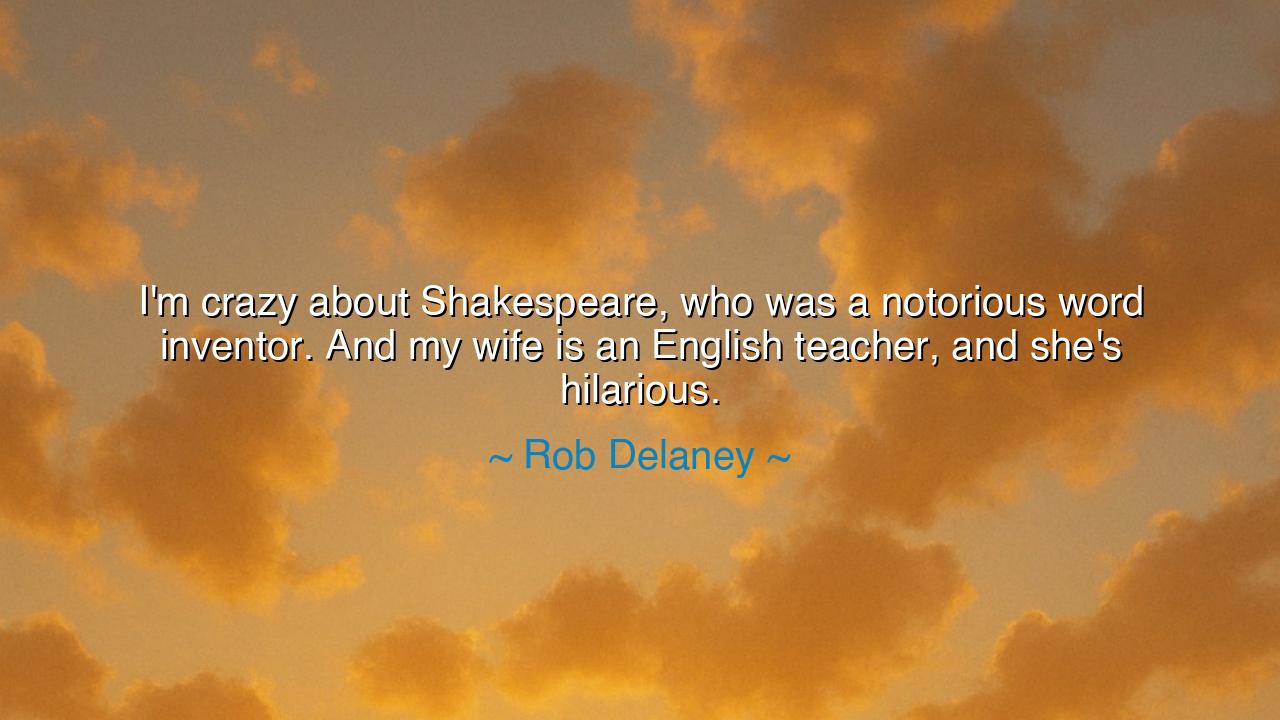
I'm crazy about Shakespeare, who was a notorious word inventor.
I'm crazy about Shakespeare, who was a notorious word inventor. And my wife is an English teacher, and she's hilarious.






Rob Delaney, the comedian and writer, once said: “I’m crazy about Shakespeare, who was a notorious word inventor. And my wife is an English teacher, and she’s hilarious.” At first hearing, these words sound lighthearted, playful, filled with humor. Yet beneath them lies a deeper truth about the power of language, the legacy of Shakespeare, and the joy of learning when shared with those we love. In this brief saying, Delaney brings together reverence for the past and delight in the present, reminding us that words are both tools of creation and instruments of laughter.
The origin of this quote rests in Delaney’s dual identity: he is both a craftsman of comedy and a lover of language. Comedy, like poetry, relies on precision of words, timing, and invention. To look to Shakespeare is fitting, for the Bard was himself a master not only of drama but of humor, weaving wit and tragedy alike into immortal verse. Shakespeare, as Delaney notes, was a “notorious word inventor,” coining terms and phrases that have since become woven into the fabric of English itself. To honor him is to recognize that words are alive, capable of being born anew in every age.
History shows us the importance of such inventiveness. When Shakespeare forged new words—like “bedazzled,” “swagger,” or “lonely”—he was not simply decorating his plays, but expanding the possibilities of human thought and expression. Each invention opened a door into new realms of feeling, allowing mankind to describe what was once inexpressible. Just as the ancient Greek poets gave us myths to explain the cosmos, so Shakespeare gave us words to capture the hidden music of the heart. Delaney’s admiration is not casual—it is the recognition of a fellow craftsman who knows the weight of every syllable.
Yet there is another layer: the mention of his wife, an English teacher, “hilarious” in her own right. This is no small detail. Here Delaney reveals that the love of words is not only a solitary pursuit, but a shared joy. The teacher, guardian of language, and the comedian, shaper of laughter, together embody the union of wisdom and mirth. To delight in words with another is to multiply their power. It echoes the ancient truth that knowledge, when shared, becomes not heavy but light, not stern but joyful.
This union of humor and learning is itself an art. It is easy to treat education as solemn and comedy as trivial, yet when the two meet, each is made stronger. The philosopher Plato warned against frivolity, but also against a life without joy. In Delaney’s words we see this balance: Shakespeare the great poet, honored for invention; the wife, the teacher, honored for laughter. Together they remind us that the highest wisdom is not dour, but playful—that language itself is a playground where invention and delight are sisters.
The lesson for us is profound: cherish the power of words, and share them with those who make you laugh. Do not treat language as a dead thing, bound in dusty books, but as a living flame that can be shaped, twisted, and reborn. Invent words if needed, as Shakespeare did. Use them to heal, to amuse, to teach, to bring light into darkness. And above all, do not walk this path alone—find companions, as Delaney found in his wife, who can make the journey joyful.
Practically, this means: read widely, not only for knowledge but for delight. Experiment with language in your own speech and writing. Treasure the teachers who reveal its mysteries. Laugh often, for laughter itself is a kind of poetry, binding souls together. And when you admire the great inventors of words, remember that you too can create, that you too can add to the living river of expression.
Thus, Rob Delaney’s playful words hold a deeper call: honor Shakespeare for his genius, honor teachers for their guidance, and honor humor for its healing. In this trinity—poet, teacher, laughter—we see the true nature of language: it is not only to instruct, nor only to move, but also to delight. And when all three are joined, words become what they were always meant to be: a bridge between souls, carrying truth with the wings of joy.






AAdministratorAdministrator
Welcome, honored guests. Please leave a comment, we will respond soon